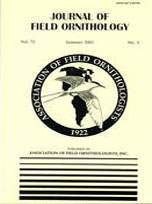Male Red-winged Blackbirds (Agelaius phoeniceus) are known to give alarm calls in response to the approach of a predator, and to encode information about the level of threat in their calling behavior. To determine whether such sentinel males alert females, we conducted a simple field experiment in which we measured the distances at which incubating females flushed from their nests in response to the approach of a human observer. Using a matched-pairs design, we measured flushing distances with a sentinel male present (mean 19.8 m), and when the same male was absent from his territory (mean 10.4 m). Female Red-winged Blackbirds flushed from their nests at significantly greater distances when males were present than when males were absent. These results and those of other studies support the existence of a “predator early warning system” in the Red-winged Blackbird.
BioOne.org will be down briefly for maintenance on 14 May 2025 between 18:00-22:00 Pacific Time US. We apologize for any inconvenience.
How to translate text using browser tools
1 January 2001
THE “PREDATOR EARLY WARNING SYSTEM” OF RED-WINGED BLACKBIRDS
Nicole Burton,
Ken Yasukawa
ACCESS THE FULL ARTICLE
It is not available for individual sale.
This article is only available to subscribers.
It is not available for individual sale.
It is not available for individual sale.

Journal of Field Ornithology
Vol. 72 • No. 1
January 2001
Vol. 72 • No. 1
January 2001




